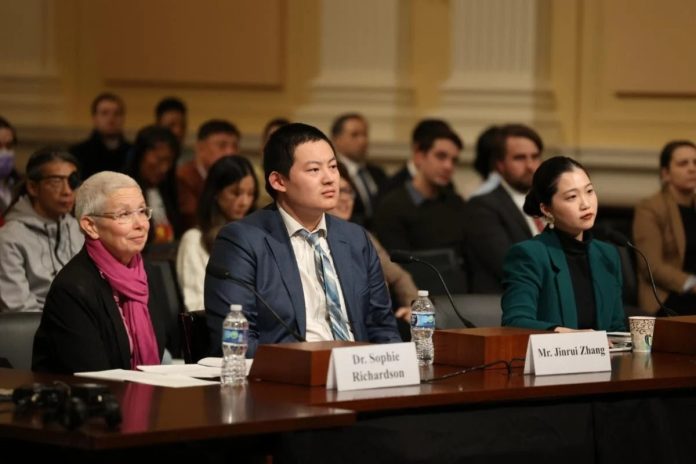Members of the US House select committee on China pledged in its final hearing this year to do all they could to hold Beijing accountable for any cross-border targeting of activists, hours before the Hong Kong government announced HK$1 million (US$128,000) bounties on five more opposition figures.
“We will do everything in our power to hold the [ Chinese Communist Party] accountable when it violates human rights and silences speech here in America,” said Raja Krishnamoorthi of Illinois, the top Democrat on the bipartisan panel.
Mike Gallagher, a Wisconsin Republican and the committee’s chair, said: “We lose nothing by putting human rights at the forefront of our agenda.”
The hearing, titled “CCP transnational repression: the Party’s effort to silence and coerce critics overseas”, sought to feature first-hand testimony from alleged victims and generate ideas for legislative action.
Wednesday’s witnesses included Anna Kwok of the Washington-based Hong Kong Democracy Council; Jinrui Zhang, a Georgetown University law student; and Sophie Richardson, a former China director at the New York-based Human Rights Watch.
Kwok is one of eight opposition figures who was targeted in a bounty list announced in July by the Hong Kong government. Along with the 12 others now on the list, she is accused of violating the city’s national security law.
Testifying before lawmakers, Kwok described receiving online threats before a planned protest at the Asia-Pacific Economic Cooperation summit last month in San Francisco, where US President Joe Biden and Chinese President Xi Jinping met in person.
“I am trapped in this constant fear of being hunted,” she said.
Human rights groups have accused the Chinese government of supporting incidents of physical and online harassment that they said occurred during the summit, but there has been no definitive evidence tying Beijing to the acts.
The Chinese embassy in Washington has denied involvement.
The witnesses on Wednesday drew a distinction between “formal” and “informal” or more subtle types of transnational repression, a term typically referring to the targeting of diaspora by governments.
“Formal repression is carried out under the orders of the Chinese state by government workers, while informal repression is carried out organically by CCP supporters,” Zhang testified.
The witnesses also spoke of efforts by the Chinese and Hong Kong governments to target their relatives in their absence.
Zhang said his family in the mainland was harassed and threatened by police on four occasions since June as a result of his activities in the US, which included protesting against China’s zero-Covid controls.
“Once an official pulled out a printed copy of my private text messages with my mother and sister on WeChat to show my father that I harboured the thought of supporting democracy,” he testified.
Zhang claimed that “about a dozen” Chinese students also living in Washington have had their family back home similarly targeted in the past year.
The witnesses urged the committee to take action to grant victims easier access to legal status and improve research on Chinese influence networks operating abroad.
They further called for increased outreach from members of Congress to diaspora communities and better training to help law enforcement recognise and handle cases.
Lawmakers also considered several proposals, including one that would revoke the student visas of those who report on their fellow classmates’ activities to foreign governments.
Wednesday’s hearing was the latest in a flurry of congressional activity this week on Beijing’s role in transnational repression.
On Tuesday, New Jersey Republican Chris Smith, chair of the Congressional Executive Commission on China, held a press conference with representatives from the Hong Kong, Uygur, Tibetan and mainland Chinese communities to discuss protesters’ experiences at Apec.
Smith pledged to send a letter to the US Justice Department calling for an investigation into the response of law enforcement to protesters’ concerns at the summit. Gallagher and Krishnamoorthi sent a similar letter in November.
On Thursday, both the commission and select committee denounced the new bounties placed on Hong Kong activists, calling for sanctions against the officials involved.
“We urge the administration to sanction Hong Kong officials responsible, especially those in the National Security Department and those who harass family members of the activists in HK,” the commission chairs wrote on X, formerly Twitter.
Senator Jeff Merkley, an Oregon Democrat and co-chair of the commission, earlier this year introduced a bipartisan bill to expand and codify US government responses to transnational repression.
The commission has also backed a bill to close Hong Kong’s economic and trade offices in the US, which activists claim serve as a vehicle for surveillance.









































